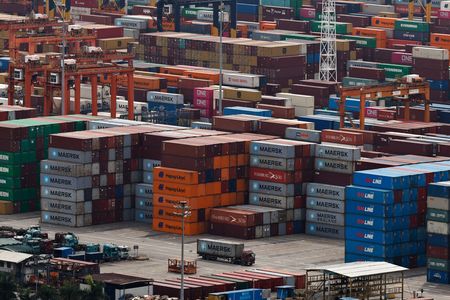By Lisa Barrington, Tim Hepher and Abhijith Ganapavaram
SEOUL/PARIS (Reuters) -Boeing is looking to resell potentially dozens of planes locked out of China by tariffs after repatriating a third jet to the United States rather than store it without willing buyers.
The move to prevent a repeat of the costly build-up of undelivered jets seen during past fluctuations in Chinese imports comes as the planemaker redoubles efforts to save cash and pay off debt by selling off part of its services business.
Boeing took the rare step of publicly flagging the potential aircraft sale during an analyst call on Wednesday, saying there would be no shortage of buyers in a tight jet market.
“Customers are calling, asking for additional airplanes,” CFO Brian West said. Such negotiations are usually kept tightly under wraps.
“Due to the tariffs, many of our customers in China have indicated that they will not take delivery,” CEO Kelly Ortberg said.
Industry sources said the comments were seen as a message to Beijing and Washington that the tariff war between the world’s two largest economies would be hugely costly as airlines scramble for capacity and Boeing recovers from multiple crises.
U.S. President Donald Trump this month raised baseline tariffs on Chinese imports to 145%. In retaliation, China imposed a 125% tariff on U.S. goods.
However, West cautioned that things could change quickly.
Washington signalled openness to de-escalating the trade war this week, stating that high tariffs between the United States and China are not sustainable.
Potential alternative markets include India, Latin America and Southeast Asia but discussions have barely begun, industry sources said. Air India is seen among potential bidders on behalf of low-cost unit Air India Express.
However, experts warned that carrying out the threat to divert jets to other buyers would not be like throwing a switch.
Finding new customers after planes have been built “can be a costly endeavour”, industry publication Leeham News said.
Experts say many components, such as cabins, are picked by airlines and switching configurations could cost millions of dollars. Doing so may also create a tangle of contractual commitments and need the co-operation of the original buyer.
For its part, China has urged Washington to abandon the tariffs but its airlines are seen as hungry for new planes to meet demand and satisfy domestic aircraft age restrictions.
“This will be extremely complicated. Everyone is flexing muscle but nobody completely has the upper hand,” said a senior aircraft finance industry source, asking not to be named.
RETURN TRIP
Boeing’s public stand follows a threat from tariffs to the aerospace industry’s decade-old duty-free trading status. Senior industry officials say, however, there is no clear evidence of a reported official Chinese government ban on U.S. jets.
The move to repatriate and re-market jets stands in contrast to a build-up seen during an almost five-year import freeze on 737 MAX jets into China and previous trade tensions.
“We’re not going to continue to build aircraft for customers who will not take them,” Ortberg told analysts.
Two jets ferried to China in March for delivery to Xiamen Airlines returned to Boeing in Seattle in the past week.
A third 737 MAX flew from Boeing’s Zhoushan completion centre near Shanghai to the U.S. territory of Guam on Thursday, Flightradar24 data showed.
Guam is one of the stops Boeing delivery flights make on the 5,000-mile (8,000-km) journey across the Pacific.
The third plane was initially built for Air China, according to Aviation Flights Group. The flag carrier did not respond to a request for comment.
It had been ferried from Seattle on April 5, in the period between Trump first announcing tariffs on China and Beijing starting to enforce its own ramped-up tariffs on U.S. goods.
Boeing says China represents around 10% of its backlog of commercial planes. It has been losing market share to European rival Airbus in recent years.
Boeing had planned to deliver around 50 new planes to China over the rest of this year, West said. It is studying options for re-marketing 41 already built or in production.
Hovering in the background is Airbus, though it is unclear how the U.S.-China rift might affect Boeing’s arch-rival.
Airbus has been in on-off negotiations for at least a year to try to grab a huge order of up to 500 jets, though China tends to tread carefully over all major purchase decisions during times of geopolitical uncertainty, industry sources said.
Airbus said it never comments on commercial discussions that may or may not be happening.
(Reporting by Lisa Barrington in Seoul, Tim Hepher in Paris, and Abhijith Ganapavaram. Editing by Jacqueline Wong and Mark Potter)













